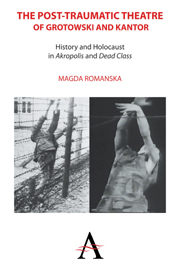 The Post-traumatic Theatre of Grotowski and Kantor
The Post-traumatic Theatre of Grotowski and Kantor from Part II - Our Memory: Kantor's Dead Class
There are many reasons Poles were enraptured by Dead Class: Kantor captured the trauma of the national history in a way that was profound but indirect, tragic but dignified, sorrowful but also fatalistically ironic. Jan Kłossowicz poignantly claimed: “I don't know who today could write a play with equal emotional impact, a play as rich in meaning and as immersed in its own cultural tradition.” And in 1986, eleven years after the premiere of Dead Class, Jerzy Tymicki wrote that Kantor's “The Dead Class (1975) and Wielopole, Wielopole (1980) were wise, deep, spectacular and expressive performances – perfect alloys of traditional and modern art, theatre and happenings, the culture of the exterminated Polish Jews, and national archetypes.” Indeed, Dead Class alludes to Polish history via a multilayered theatrical structure, embedded within the broader literary and artistic canon. First, it refers to the early twentieth century, right before World War I, which many consider something of a magical period in Polish history. During the last few years leading up to World War I, Poles were quietly and with trepidation anticipating the eventual victory; they were both hopeful and resigned. Hopeful because the approaching conflict offered the possibility of independence, and resigned because, judging by the past failed attempts, the war could also mean yet another pointless bloodbath. The writers of that period permitted themselves to use the national struggle solely as a background for a personal Bildungsroman, very much in the style of those written by other European modernist authors.
To save this book to your Kindle, first ensure [email protected] is added to your Approved Personal Document E-mail List under your Personal Document Settings on the Manage Your Content and Devices page of your Amazon account. Then enter the ‘name’ part of your Kindle email address below. Find out more about saving to your Kindle.
Note you can select to save to either the @free.kindle.com or @kindle.com variations. ‘@free.kindle.com’ emails are free but can only be saved to your device when it is connected to wi-fi. ‘@kindle.com’ emails can be delivered even when you are not connected to wi-fi, but note that service fees apply.
Find out more about the Kindle Personal Document Service.
To save content items to your account, please confirm that you agree to abide by our usage policies. If this is the first time you use this feature, you will be asked to authorise Cambridge Core to connect with your account. Find out more about saving content to Dropbox.
To save content items to your account, please confirm that you agree to abide by our usage policies. If this is the first time you use this feature, you will be asked to authorise Cambridge Core to connect with your account. Find out more about saving content to Google Drive.